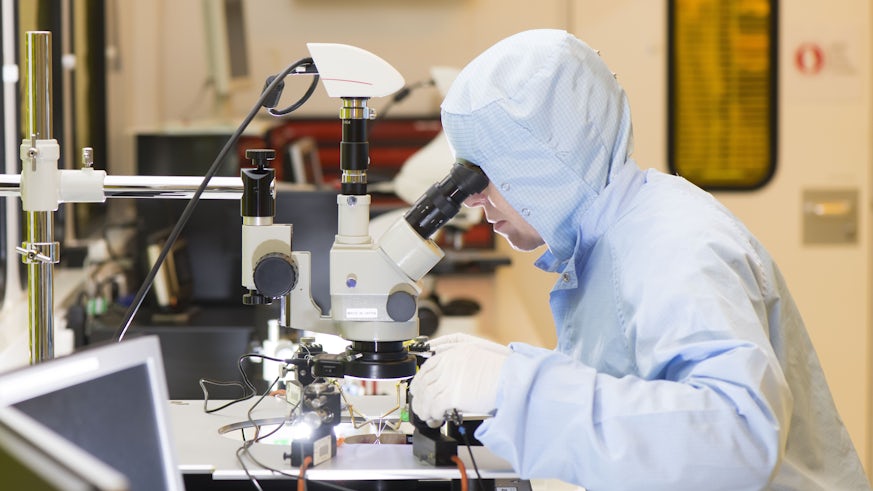‘SMART expertise’ supports growing semiconductor cluster
1 April 2021

A £1.8m project backed by Welsh Government’s ‘SMART Expertise’ programme will help the world’s first Compound Semiconductor cluster solve real-world industry challenges and bring economic benefits to Wales.
Dr Samuel Shutts, a Post-Doctoral Research Fellow in Cardiff University’s School of Physics and Astronomy has been awarded a Smart Expertise Award from Business Wales within Welsh Government to deliver ATLAS, a key project for the future of the compound semiconductor industry in Wales.
The total project value of £1.8M, is based on 50% funding from the European Regional Development Fund via the Welsh Government's SMART Expertise programme and 50% from the industry partners (Compound Semiconductor Centre, IQE Plc, SPTS Technologies, and Rockley Photonics).
The award offers financial support to innovative collaboration projects that require a range of expertise to solve industry problems, focusing on commercialisation of new products, processes or services and growth in capacity and capability to deliver Welsh economic impact.
Dr Shutts said: “ATLAS is an industry-focused project with an objective to enhance the manufacturing capability of compound semiconductor (CS) lasers, putting South Wales at the leading-edge of CS laser production. The funding aims to allow low-cost, energy efficient manufacturing in high-volume production, bringing benefits to science and industry.”
Based within the EPSRC Future Compound Semiconductor Manufacturing Hub (CS Hub), Sam will work closely with companies across South Wales specialising in the application of compound semiconductors for modern telecommunications.
“The project is a fantastic opportunity to combine the expertise and problem-solving capacity of researchers within Cardiff University to address the real-world challenges faced by today’s rapidly growing compound semiconductor industry in South Wales. It will support South Wales to become the world’s first Compound Semiconductor Cluster, with Cardiff University and the Institute for Compound Semiconductors (ICS) facility acting as key players.”
Dr Shutts’ work is closely aligned with the CSconnected project, which received £43.74m in UK government funding through UK Research and Innovation’s flagship Strength in Places Fund to develop a CS cluster.
Chris Meadows, Director, CSconnected, said: “ATLAS will help develop key processes to be scaled-up by cluster partners, enabling next generation data communications like high-definition streaming and 5G connectivity, and sensing capabilities including the face/gesture recognition capability of digital devices or the electronic systems that assist drivers to park their cars.”
Dr Shutts’ research includes photonics (study of light); laser physics; and the design, fabrication and testing of novel compound semiconductor (CS) lasers for communications, atomic sensors (clocks and magnetometers), sensing, and biomedical applications.